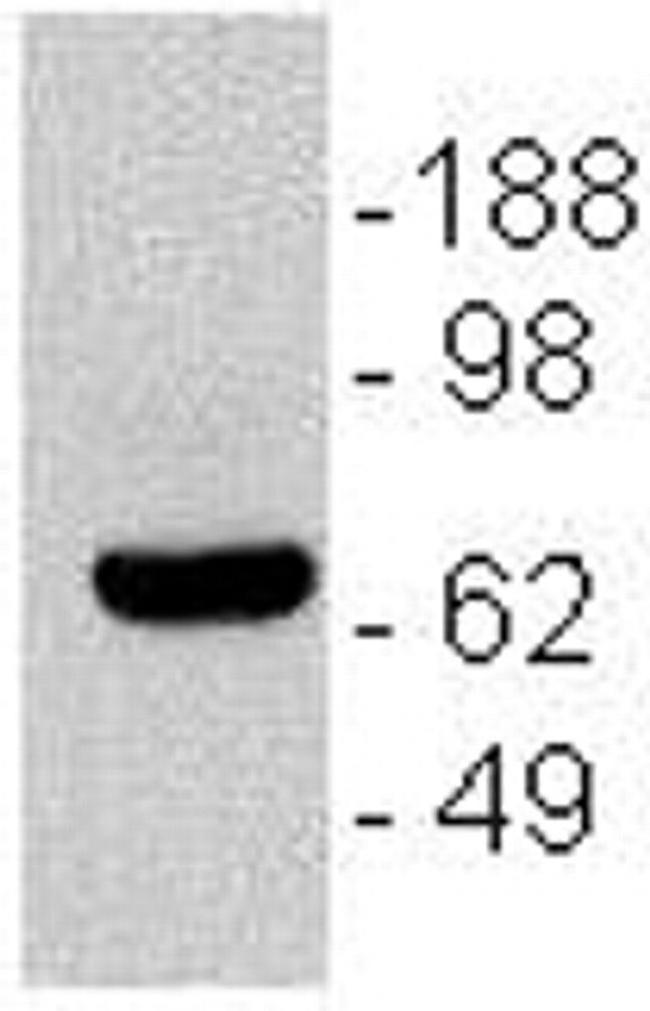Search Thermo Fisher Scientific
Invitrogen
CD196 (CCR6) Monoclonal Antibody (R6H1), eBioscience™
Product Details
14-1969-82
Species Reactivity
Published species
Host/Isotype
Class
Type
Clone
Conjugate
Form
Concentration
Purification
Storage buffer
Contains
Storage conditions
Shipping conditions
RRID
Product Specific Information
Description: This R6H1 monoclonal antibody reacts with CD196 (also known as CCR6), a seven transmembrane G protein-coupled receptor expressed on T, B, dendritic, natural killer, and Langerhans cells. This CC chemokine receptor uniquely binds MIP-3a/CCL20, a chemoattractant for dendritic cells, effector/memory T cells, and B cells. CD196 is also involved in host defense and inflammation at epithelial sites. Furthermore, this receptor has been implicated in Th17 differentiation and CD4+FoxP3+ regulatory T cell development.
Applications Reported: This R6H1 antibody has been reported for use in flow cytometric analysis, immunoblotting (WB), and immunoprecipitation.
Applications Tested: This R6H1 antibody has been tested by western blot on lysates prepared from normal human peripheral blood cells. This antibody can be used at less than or equal to 5 µg/mL.
Purity: Greater than 90%, as determined by SDS-PAGE.
Aggregation: Less than 10%, as determined by HPLC.
Filtration: 0.2 µm post-manufacturing filtered.
Target Information
CD196, also known as CCR6, is a member of the beta chemokine receptor family and is characterized by a seven transmembrane structure similar to G protein-coupled receptors. This receptor uniquely binds to macrophage inflammatory protein 3 alpha (MIP-3alpha/CCL20), which acts as a chemoattractant for dendritic cells, effector/memory T cells, and B cells. CCR6 is preferentially expressed by immature dendritic cells and memory T cells, playing a crucial role in host defense and inflammation at epithelial sites. It is important for B-lineage maturation and antigen-driven B-cell differentiation, and it regulates the migration and recruitment of dendritic and T cells during inflammatory and immunological responses. Additionally, CCR6 has been implicated in the differentiation of Th17 cells and the development of CD4+FoxP3+ regulatory T cells, highlighting its role in immune regulation. Alternatively spliced transcript variants encoding the same protein have been described for this gene, further emphasizing its functional diversity in immune processes.
For Research Use Only. Not for use in diagnostic procedures. Not for resale without express authorization.
Bioinformatics
Protein Aliases: C-C chemokine receptor type 6; C-C CKR-6; CD196; chemokine (C-C motif) receptor 6; chemokine (C-C) receptor 6; Chemokine receptor-like 3; CKR-L3; CKR6; DRY-6; DRY6; G protein-coupled receptor 29; G-protein coupled receptor 29; GPR-CY4; GPRCY4; LARC receptor; seven-transmembrane receptor, lymphocyte, 22
Gene Aliases: BN-1; C-C CKR-6; CC-CKR-6; CCR-6; CCR6; CD196; CKR-L3; CKRL3; CMKBR6; DCR2; DRY6; GPR29; GPRCY4; STRL22
UniProt ID: (Human) P51684
Entrez Gene ID: (Human) 1235

Performance Guarantee
If an Invitrogen™ antibody doesn't perform as described on our website or datasheet,we'll replace the product at no cost to you, or provide you with a credit for a future purchase.*
Learn more
We're here to help
Get expert recommendations for common problems or connect directly with an on staff expert for technical assistance related to applications, equipment and general product use.
Contact tech support















